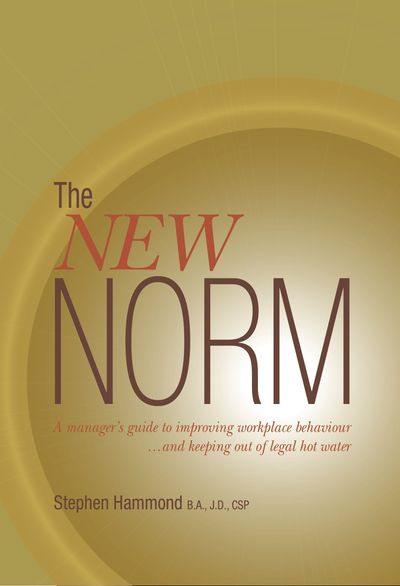Chapter sixteen
THE NEW NORM isn't crude
How do we determine being funny versus being crude? How is it that some employees can partake in sexual banter that is acceptable, yet similar behaviour can be grounds for workplace discipline? It’s not always easy to distinguish.
Linda Daw worked in the Intensive Care Unit (ICU) of the Queen Elizabeth II Hospital in Grande Prairie, Alberta. Her colleagues referred to her as a very good nurse, and the unit manager said she was “immediately impressed with her motivation and high standards of nursing.”
However, a few nurses took issue with her use of vulgar language and the way she treated new nurses in particular in a demeaning manner. Some nurses noted the use of words such as “snatch,” “taking it up the bum” and someone wanting a “wedgie.”
Some of the new nurses said Daw made them feel incompetent, and a number changed their work arrangements to avoid working with her. When this came to light and management looked into the allegations, they gave Daw a three-day suspension. It was grieved and during arbitration testimony, each of the affected nurses acknowledged that nurses often use crude and sexual language with one another.
One even told of a nurse who had recently brought in sex toys when colleagues started talking about them. However, they said it was the way Daw often made her comments in front of patients, and/or loud enough for others to hear, that distinguished her. She was also known for passing gas in front of staff and patients.
The arbitrator concluded that the evidence of the witnesses “leads to the inescapable conclusion that the Grievor treated new staff members in the ICU poorly and unprofessionally.” He also noted that Daw “treated new employees to the unit in an overly harsh manner, which had a negative effect on morale and hindered learning opportunities for these new employees.” He upheld the three-day suspension, despite evidence that other nurses also took part in sexual and crude banter.
It's clear that this nurse could have benefited from taking my Respectful Workplace online course, where we spell out bullying and harassment in the workplace.
How about a different case? David Wright was a manager working for the British Columbia Trade Development Corporation, a Crown corporation for the province of B.C. His colleague, Joe MacKay, thought it would be funny to give some women red-lace g-string panties through the workplace’s internal mail, close to Valentine’s Day.
MacKay bought the panties in the presence of Wright, and persuaded Wright to send them from his office building. One of the three women who received the panties was Oksana Exell, vice president of the corporation. She saw it as sexual harassment rather than a joke.
MacKay was fired and when Wright wouldn’t voluntarily resign, he too was fired for cause, due to sexual harassment. He sued his employer for wrongful dismissal, asking for several months’ pay in lieu of notice. During the trial it was revealed that the company allowed quite a sexualized environment.
For example, there were Chippendale dancer and firefighter calendars in the workplace, with some men’s faces placed overtop the faces of the calendar dancers. Also, some of the women gave out their “male sex object of the month award” to one of the men at work, with comments written on the award such as “Luv ya Babe! You're the best!” and “Bill, where does the line-up start!”
The judge was concerned that the men were treated as sexual objects and he was particularly concerned that V.P. Exell wrote at the bottom of the sex-object award, “I can't believe I'm signing this! Oksana.” They were having all kinds of “fun” in a very sexualized workplace, and when Wright and MacKay went further, the judge didn’t think they should be thrown under the bus.
As a result, the Trade Corporation was ordered to pay David Wright twelve months’ pay in lieu of notice, as well as his legal costs.
There are always going to be subtle differences between what is right and wrong at work. It’s not always easy to distinguish between the two, but so much comes down to the little details and the tone.

British Columbia Trade
Development Corporation
The OLD NORM
- has a good time and assumes everyone understands her sense of humour.
- When others call him on his bad humour or gags, will say, “I’m only joking” or “Can’t you take a joke?”, deflecting his problem onto others.
- pushes the boundaries when it comes to crude remarks and sexual jokes and banter at work, because after all, we’re all adults here.
- Has a good time at the expense of others.
The NEW NORM
- realizes it’s not easy raising children and working at the same time.
- knows he has a workplace to run, but also knows the law is clear about accommodating employees when a human rights issue is involved.
- will work with parents to find an accommodation that can work for both the employer and employee.
- understands that “accommodation to the point of undue hardship” means the employer has to try hard.
Suggestions for the New Norm:
01
Even if you can’t define it, you likely know it. There’s a saying, “I don’t know much about art, but I know what I like.” Often that’s true about knowing exactly when something is acceptable and when it’s not. We have all the legal definitions of what is sexual harassment, racial discrimination, bullying, etc., but who wants to live by some legal journal? If you’re about to say something and it doesn’t seem right, better to clam up than get into trouble.
02
Colleagues might not be as upfront as friends. Our friends might forgive us when we say or do something stupid, or they may be very frank with us. That’s not always the case at work, where colleagues sometimes don’t feel comfortable being upfront, in case that poisons the relationship. Therefore, you might be (consistently) saying something that really bugs people, but you may not hear about it until there’s a formal complaint or legal proceeding. Be more aware of what you say at work.
03
Be consistent. If as a supervisor you allow, or as a colleague you are part of sexual or crude behaviours or jokes, it’s going to be much tougher to take the high road and come down hard on inappropriate behaviour.
This chapter lets you know
crude behaviour won’t be tolerated at work as it might be considered bullying or sexual harassment.
For more examples of other important information about unacceptable behaviour, consider reading
Chapter 2: The New Norm realizes “consent” can be complex when power is involved
Purchase a copy of The New Norm, or if you think all your supervisors and managers, could learn many valuable lessons about creating a respectful workplace, free of harassment, bullying and discrimination, you can get volume discounts.
What one reader has to say about Stephen’s book, The New Norm
“Stephen’s book is a brilliant reminder of workplace situations that are disturbing, yet slip by unaddressed by so many in both the private and public sector. When these behaviours are unaddressed, they become the norm because we allow them to be.
Just like his first book, Stephen is insightful, his writing is moving and he inspires his readers to take immediate action to disapprove of, and address harassment and other inappropriate behaviour every time we see it, feel it and hear about it. In a concise format, he gives us a series of snapshots of old vs. new, acceptable vs. unacceptable, right vs. wrong, in a way that is understandable.
If workplace leaders take just some of Stephen’s practical advice, they will go a long way to rid their workplace of unacceptable behaviours such as harassment, discrimination and bullying. It’s clear that to create Stephen’s “New Norm,” we need to ACT NOW! We can’t wait any longer.”
Tatjana Zatezalo
Manager, Organizational Development, Halifax Regional Municipality

Respectful Workplace Online Training Course
If you, your employees or your managers want more information,
sign up for my new online training course:
The Respectful Workplace in Canada.
With 10 modules of useful, relevant and current information,
this course can help everyone at your workplace.
This may be the best online harassment training your people will get.
Stephen Hammond is a lawyer turned speaker and consultant in the field of harassment, sexual harassment, bullying and discrimination at work.
The New Norm is Stephen’s third book.
Here’s more information about Stephen.


